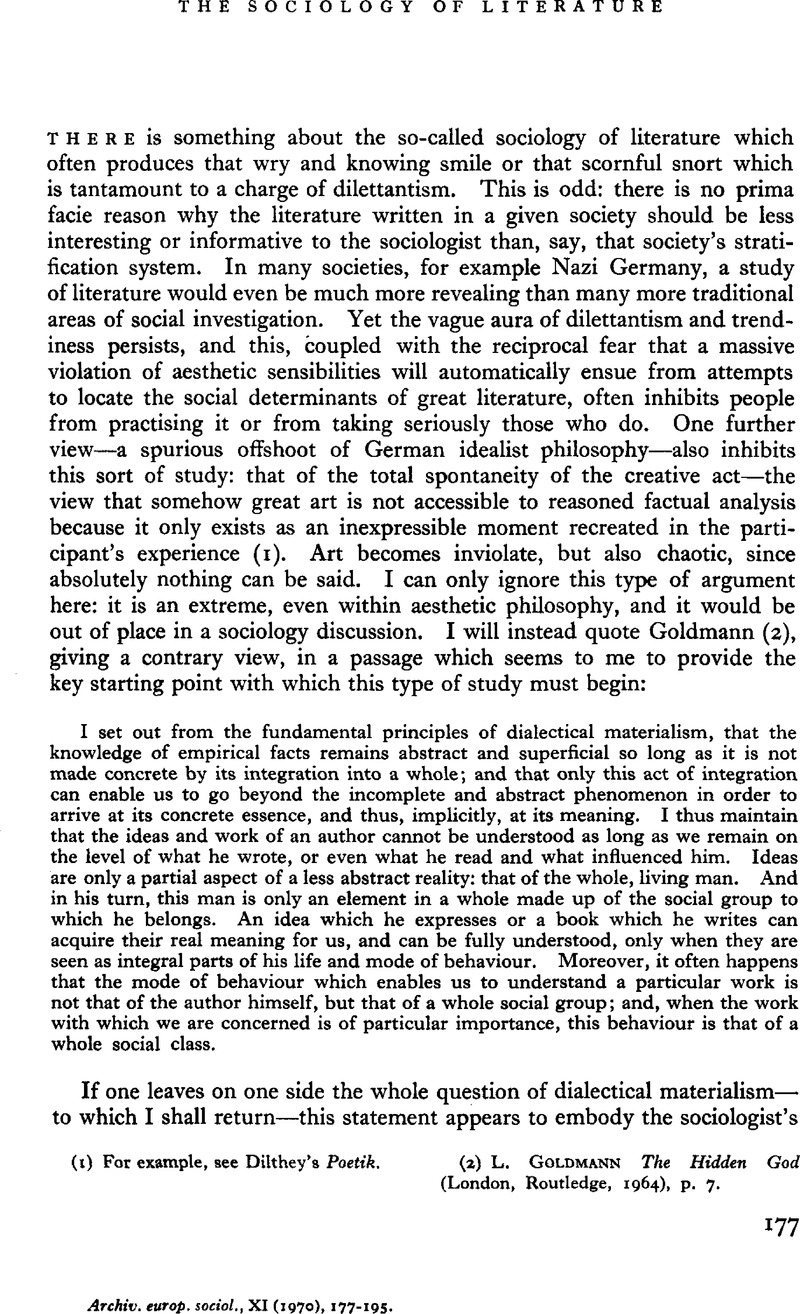Published online by Cambridge University Press: 28 July 2009

page 177 note (1) For example, see Dilthey's Poetik.
page 177 note (2) Goldmann, L.The Hidden God (London, Routledge, 1964), p. 7Google Scholar.
page 178 note (3) Sartre, J. P., What is Literature? (Peregrine Books, 1967)Google Scholar, passim.
page 178 note (4) Goldmann, L., op. dt. p. 759Google Scholar.
page 179 note (5) Williams, Raymond, Two Broadcast Talks. The Listener, 10 1967Google Scholar. This is a development of themes which appear in Williams two main works, ‘Culture and Society’ and ‘The Long Revolution’.
page 180 note (6) Leavis, F. R., The Common Pursuit (Peregrine Books, 1962), p. 198Google Scholar.
page 180 note (7) This dispute is reprinted in Eric Bentley, , The Importance of Scrutiny (New York, Grove Press, 1948)Google Scholar.
page 181 note (8) For the general approach to problems of method, see Huaco, G. A., The Sociology of Film Art (New York, Basic Books, 1965)Google Scholar. The current remarks about the Mexican novel are derived from hitherto unpublished research papers, and from conversations with Huaco in 1968.
page 182 note (9) Lukács, G., The Meaning of Contemporary Realism (Merlin Press, 1963)Google Scholar.
page 183 note (10) Quoted in Goldmann, , op. cit. p. 34Google Scholar.
page 184 note (11) For a discussion of the adult male population of Athens, and the place of the hoplites in the social structure, see Jones, A. H. M., Athenian Democracy (Oxford, Blackwell, 1957), appendixGoogle Scholar; also Jones, in Finley, M. I. (ed.), Slavery in Classical Antiquity, (Cambridge, Heffer, 1960)Google Scholar. Jones does not specifically suggest the argument as it appears here, but I believe that his perceptive discussion of the empirical evidence does bear out the main propositions.
page 185 note (12) Homer, , Iliad, Book 2, XI, 212–269Google Scholar.
page 186 note (13) I recognise that this is a controversial position and have written the Appendix in defence of it, should anyone be inclined to follow up this particular point.
page 186 note (14) Cf. Dawe, R. D., Characterisation in Aeschylus, Proceedings of the Philological Society, 1966, p. 1Google Scholar.
page 186 note (15) Fraenkel, E., The Agamemnon, a commentary (Oxford 1957)Google Scholar.
page 186 note (16) Denniston, J. D. and Page, Denys, The Agamemnon (Oxford 1957)Google Scholar.
page 187 note (17) Aeschylus, , Agamemnon, I, 137Google Scholar.
page 187 note (18) Ibid. I, 212
pabe 187 note (19) Ibid. I, 206–I, 210.
page 187 note (20) Ibid. I, 219 ff.
page 187 note (21) Quoted Denniston, and Page, , op. cit. p. xxvGoogle Scholar.
page 187 note (22) Op. cit. XIII and XXIV.
page 187 note (23) Aeschylus, , op. cit. I, 218Google Scholar.
page 188 note (24) Aeschylus, , Seven Against Thebes, I, 718Google Scholar.
page 189 note (25) F. Nietzsche, The Birth of Tragedy.
page 189 note (26) Levi-Strauss, , The Savage Mind (Weidenfeld and Nicholson, 1966)Google Scholar, final chapter.
page 190 note (27) Goldmann, , The Hidden God, p. 48Google Scholar.
page 191 note (28) Leach, E. R., The Legitimacy of Solomon, European Journal of Sociology, VII (1966), p. 62Google Scholar.
page 191 note (29) Ibid. p. 100.
page 191 note (30) Barthes, R., Elements of Semiology (London, Cape, 1967), Part IIGoogle Scholar, passim.
page 191 note (31) Cl. Lévi-Strauss, , The Scope of Anthropology (London, Cape, 1967), p. 1 sqqGoogle Scholar.
page 193 note (1) Podlecki, A. J., The political back ground to Aeschylean tragedy (Ann Arbor 1966)Google Scholar.
page 193 note (2) Ibid. pp. 4–7.
page 193 note (3) Ibid. p. 40.
page 194 note (4) Podlecki, , op. cit. p. VIIIGoogle Scholar.
page 194 note (5) “You are the state, you are the people Ruler unquestioned, you control The altar that is your country's hearth; You fear no vote; by your mere nod You, monarch on one throne, decide all issues.”
Aeschylus, , Suppliants, p. 65, II, 370–375Google Scholar.
page 194 note (6) Ehrenburg, V., Origins of Democracy, Historia, I (1950), p. 517Google Scholar.